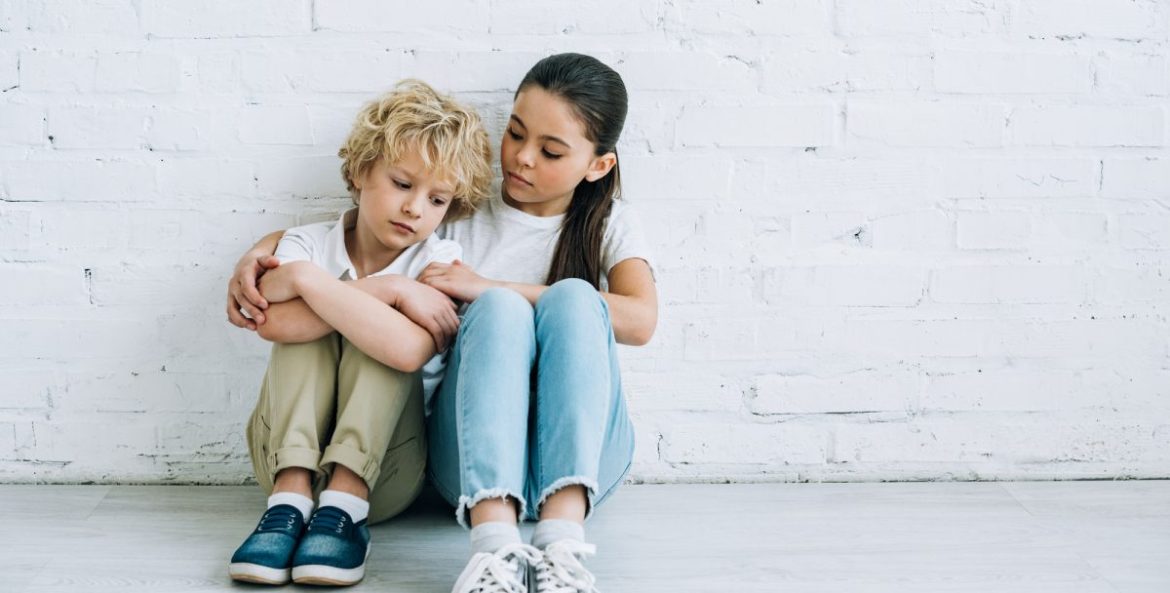The traumatic events of the last two months have greatly affected adults and children, and teachers and students need to adjust the educational process under these conditions.
The “New Ukrainian School” learned about the intricacies of teaching children under stress from Olena Bozhor, a trauma therapist with many years of experience, who left Buchi with her family after two weeks spent under the bombings.
THE FILTER THROUGH WHICH WE PERCEIVE REALITY
“I experienced first-hand what it means to be in immediate danger with the whole family. When, after 15 days, in the very epicenter of war events, there was an opportunity to leave Buchi, it was scary to even get into the car and start driving,” Olena Bozhor recalls.
She is a family and child psychologist and psychotherapist, an art therapist and an accredited EMDR therapist and supervisor. Olena has many years of experience working with children in group, individual and family formats, is a trainer of the British-Norwegian project “Children and War” and the art director of the “I da Vinci” club.
The leading theme in Elena’s practice is stress and psychological trauma, which leave traumatic memories in a person’s memory – episodes of various types of violence, memories related to road accidents, being in war zones, natural disasters, etc. The interlocutor considers EMDR therapy to be one of the most effective methods of psychological assistance.
Reference: EMDR (Eye Movement Desensitization and Reprocessing) translates as eye movement desensitization and reprocessing (trauma processing). The method was created in 1987 by Dr. Frances Shapiro from the Institute for Psychical Research in Palo Alto, USA. It is an innovative clinical treatment with empirically proven efficacy in helping people who have survived traumatic experiences.
“I deliberately did not prepare for the conversation in advance,” says Olena Bozhor. – After all, there are a huge number of freely available tips and even lists of practical exercises – at least write a manual.”
Olena wanted to be spontaneous and give “live” advice. To do this, she imagines that a teacher who complains about problems with the organization of education has come to her for a psychological consultation.
“First of all, I would worry about the teacher himself,” says the trauma therapist. – Stabilization and psychoeducation are necessary. The first gives an opportunity to restore the balance, and the second – to understand why exactly children behave in this way and not differently at these times, to stop blaming yourself for inefficiency as a professional and lose self-esteem. Learn how to act and how to better communicate with students.”
Step 1: Stabilization
Take care of yourself. Think about how you feel, what do you feel? Restore balance by focusing on your body: even your breathing, feel your feet on a hard surface. You can perform diaphragmatic breathing: inflating the stomach, inhaling through the nose, and “blowing” out, exhaling through the mouth.
Observing how the air enters and exits the body, we return to the “here and now”. This is the easiest thing to do. Children, in order to release excess uncontrolled energy, can play like this: tense and relax all parts of the body.
More stabilization exercises can be found here. You can also use an audio recording of the grounding exercise.
Step 2: Psychoeducation
Knowledge also stabilizes. By understanding how a child’s body works when he experiences traumatic events, the teacher will protect himself from wrong reactions and have more peace of mind. In a situation of constant stress and tension, students can suddenly show aggression, be irritable, distracted, or not listen at all precisely because the body’s correct response is not abnormal circumstances. This critically affects a person’s perception of reality, filtering it in the current mode.
Having received a little psychoeducation, the teacher will be able to distinguish these reactions and understand whether it is possible to help the child to concentrate now, or it is better to distract, take a break and perform a relaxation exercise.
Step 3: Cooperation with parents
It is difficult to overestimate the role of emotional support from parents in these times. If the teacher noticed that the child is not behaving as usual, it is necessary to talk to the parents individually.
Parents also need psychoeducation to understand what can and cannot be done when a child experiences traumatic memories. Now more than ever, physical contact, hugs and emotional support, unconditional love are important. A child needs to feel that he is loved just like that, and this love does not need to be earned, something to prove to someone.
It is important to accept the child’s emotions and reactions calmly, not to scold and not to forbid them from showing. Parents should also show their emotions, not be afraid to talk about them. Of course, there is no need to panic, but you can cry and even scream. With this, parents teach children that we should not hide, “freeze” what we feel. It is also important to show how we calm down at the end and return to the resource state.
Olena Bozhor notes that a child’s brain is very “flexible” and the level of adaptation to survival in war conditions increases many times if there are loving parents nearby.
“Furthermore,” the psychologist continues, “it is known for certain that evacuating children separately from their parents, even if they are placed in a safe place, in the best conditions, provided with psychological support and surrounded by care, traumatizes children much more than when they remain with their parents , even in bad conditions”.
HOW THE RULES HELP TRAINING IN WARTIME
According to Elena, now there is no practical opportunity to make acquiring new knowledge, achieving high results and good grades the main thing. The main thing is that the child receives enough support and a sense of security, which he lost because of the traumatic experience.
The psychotherapist advises to shorten the duration of lessons: classes for younger students should last 15-20 minutes. The rest of the time should ideally be used for tea together and friendly communication, offer the children to wrap themselves in a blanket, which will give them a sense of security.
“Students of middle and older age can withstand a longer time,” Olena continues. – However, 15 minutes after the start of the lesson, it is useful to take a few minutes to relax: distract yourself, joke, laugh.”
The trauma therapist also emphasizes the need to establish clear rules, because children feel more comfortable if they are shown the limits of what is allowed. Otherwise, they will check where those limits are.
“The teacher makes the rules himself. But children like (and it is useful) to participate in the discussion and acceptance of both the rules themselves and methods of punishment for their violation. For teenagers, it is enough to make a list of 5-7 rules; younger schoolchildren perceive images better, so rules can be drawn for them.”
Next, Olena lists the most effective rules for online lessons:
The rule of respect: it is forbidden to interrupt, devalue someone’s feelings, insult and humiliate.
The rule is to speak only for yourself: even if someone’s behavior annoys you, and someone’s words offend you, voice your own feelings on this matter. For example, not “Sashko prevents me from listening”, but “I can’t hear the teacher”. Not “Sofia insults me”, but “such words hurt me”.
The friendly support rule can be implemented using gestures and emoticons in chat.
The rule of safe manifestation of aggression. You can ask children how they imagine a safe manifestation of aggression. Discuss whether it is safe if we, for example, break everything around us? Obviously not. At the same time, it is safe to pound the pillow with your fists. It is safe to draw your anger on paper and then crumple and tear that sheet.
The “gift of attention” rule means that when someone is feeling lonely or needs support, it can be agreed that he or she raises their hand and voices it. In response, he receives words of support and positive feedback from each of his classmates and the teacher.
The “free leg” rule means that when someone wants to go to the bathroom, he or she can do so without asking anyone.
– What to do when someone breaks the rules?
“First of all, if the children participated in the discussion and approval of the rules, then they consider them acceptable, useful and the kind that they want to follow,” says Olena Bozhor. – Secondly, it is necessary to understand that behind the systematic violation of the rules there is usually a desire to get more attention. And thirdly, the punishment of receiving one less candy is enough to make everyone try. We are talking about smaller children, of course.”
– What about teenagers, for example, if they quote the famous phrase about “Russian ship”?
“Here, everything depends on the teacher,” Olena believes. – You can, for example, introduce a “stop-mate” rule when mats are prohibited. On the other hand, the mentioned phrase became legendary, and even embodied in the image on a postage stamp.
Fighting in general is one of the ways of safe manifestation of aggression, even more so in conditions when the invaders are trying to destroy your country, kill your neighbors. And for teenagers, swearing is a natural part of growing up. And no matter how much anyone wants, no matter what rules they invent, it is impossible to prevent this 100%. Therefore, in fact, it is easier to legalize the phrase about a Russian ship than to ban it.”
The psychotherapist emphasizes that older students want to learn only from a teacher who can interest them, understands their views, and does not devalue their choices. At the same time, teenagers themselves can often devalue the teacher’s opinion, “troll” and make very sharp jokes.
“But this is a feature of their age. And if the teacher understands and takes it into account, then he does not take offense, is not emotionally traumatized and does not lose self-esteem.”
Last but not least, allow the reactions to happen.
On the Internet, the therapist came across advice to avoid talking about what the children experienced or saw in the war. Although in reality everything is exactly the opposite.
She explains that parents and teachers are afraid to talk about terrible events with their children, because they consider these memories too traumatic to discuss. As a result, adults decide that it is better not to ask anything at all, and when children start to share themselves, they stop such conversations.
“This definitely cannot be done,” Olena Bozhor emphasizes. – Especially when the child is ready to talk about his condition and emotions, even in class. It is necessary to understand that, in the end, thanks to the fact that the child pours out what was rushing to the surface, he will calm down, feel that in this space he can be himself, trust, receive support and heal his heart, his soul. Therefore, she will continue to work with pleasure.”
WHO’S GOOD? – YOU ARE GOOD!
The psychologist is convinced that teachers are able to create an atmosphere of emotional security, trust and acceptance in classes (including online).
She explains that it is thanks to this that children will want to return to classes and gradually become better involved in learning. But first they need to be given time, lots of support and love. Accept not only positive emotions, but also negative ones.
“Let there not be high scores,” the interlocutor concludes, “but if the students feel emotionally protected, then the teacher has already done her job at this point.” She is already a great person and a great professional.
Olena Bozhor emphasizes that praise is particularly effective and even healing:
“Now it is necessary to praise children constantly, much more than usual. Even if the child did not succeed in something or did not complete the homework at all because he could not concentrate, you can praise him for the smallest successes, for the fact that he tried, made an effort. If the child dared to tell about the terrible things he experienced in class, then the teacher should praise him for his courage.
Adults and children are now experiencing the loss of their usual life, Olena concludes. – But in fact, it is important for all of us – parents, teachers, and children – to feel that we are good, that we are well done. Everyone has an “inner child” and they want recognition, praise, acceptance and unconditional love.
Victoria Makarova, “New Ukrainian School”





